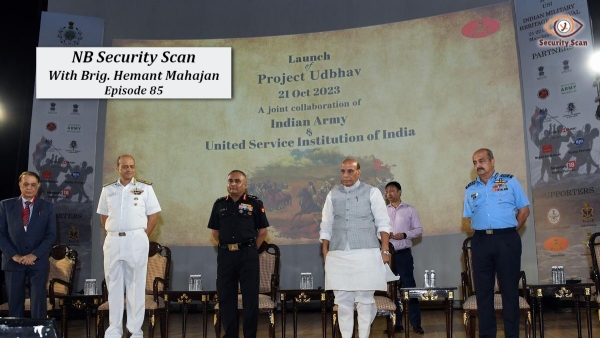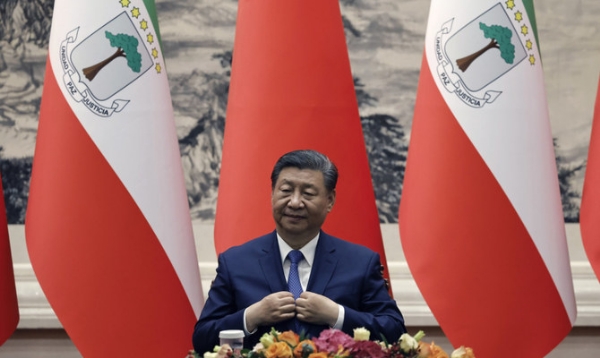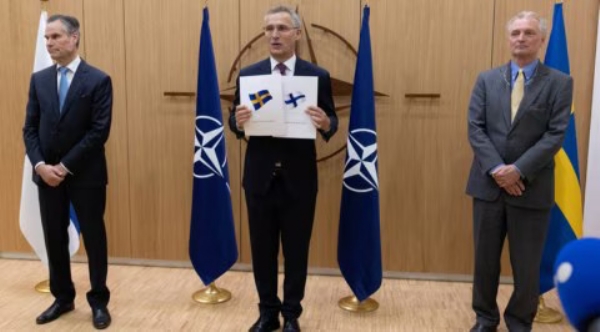#SecurityScan 85: Project Udbhav, Indian warships to in South China sea & much more
Armenia can be a test case for India"s growing role in international security amid exceptional turmoil that has jostled the alliance matrix in the south Caucasus.
Total Views |
This article is a summary of important events that have taken place in the last one week affecting India's national security.
News In Brief
- India and Chabahar: Navigating the Tides of US Sanctions.
- India will develop the Shahid-Behesti Terminal of Iran’s strategic Chabahar port. Can it so do it without facing U.S. sanctions?
- Thousands of middle-class Chinese take risky, illegal route to U.S.
- Economic malaise, debt and despair push families to trek through jungle to Mexico border.

- Australia bluntly weaponizes a Chinese student’s visa. PhD candidate Xiaolong Zhu’s visa cancelled for weapons of mass destruction links .
- China Is Winning the Minerals War, Western efforts to make a dent are languishing;
- For the past few years, the West has been trying to break China’s grip on minerals that are critical for defense and green technologies. Despite their efforts, Chinese companies are becoming more dominant, not less.
- They are expanding operations, supercharging supply and causing prices to drop. But are not able to challenge the Chinese efforts..
- China Coast Guard dispatch vessels over 300 times per day in 2023 for law enforcement, achieving significant results in law enforcement actions such as combating smuggling, illegal fishing, and theft of sea sand, according to a meeting on Tuesday to summarize the CCG's law enforcement achievements in 2023 that was attended by the Global Times.
- Russia unsettles Nato with plan to redraw Baltic Sea borders
- Defence ministry’s proposal draws condemnation from Lithuania and Finland.
- Ultra-processed foods could damage your brain, Harvard study says.
- Iran’s Use of Proxy Warfare Likely to Persist, Experts Say.
- The sudden death of President Ebrahim Raisi is not expected to affect the actions of groups like Hezbollah and the Houthis, which are vital to Iran’s power.
#COUNTERING CHINESE MULTI DOMAIN , GREY ZONE, HIGH BREED WARFARE
How China Will Squeeze, Not Seize, Taiwan, A Slow Strangulation Could Be Just as Bad as a War
Testifying before the Senate Armed Services Committee in 2021, Admiral Philip Davidson, the retiring commander of U.S. military joint forces in the Indo-Pacific, expressed concern that China was accelerating its timeline to unify with Taiwan by amphibious invasion. “I think the threat will manifest during this decade, in fact in the next six years,” he warned. This assessment that the United States is up against an urgent deadline to head off a Chinese attack on Taiwan—dubbed the “Davidson Window”—has since become a driving force in U.S. defense strategy and policy in Asia.
If the best predictor of future behavior is past behavior, the United States and Taiwan should be as focused on developing strategies to prevent Taiwan’s slow subjugation as they are on forestalling outright invasion.
‘Brand Taiwan’ Is the New President’s Secret Weapon
If there’s one thing Taiwan knows how to do, it’s throw a party. There was no weighty self-importance on display at Lai Ching-te’s presidential inauguration on Monday. It was an event celebrated with fighter jet flyovers and performances from Taiwanese hip-hop artists, gymnasts and baseballers. The message to Beijing was clear — just across the strait is living proof that a Chinese-speaking democracy of 23 million people can exist and thrive.
While the atmosphere at Lai’s inauguration was festive, his first public address as president was extremely serious — a reflection of how high the stakes are, and what he’s fighting to preserve.
Beijing has hit out at the Taiwanese leader for sending ‘dangerous signals’ in his inauguration speech. He made no mention of the 1992 ‘one China’ consensus and urged Beijing to stop intimidating the island.
A furious China launched "punishment" drills around Taiwan on Thursday in what it said was a response to "separatist acts", sending up heavily armed warplanes and staging mock attacks as state media denounced newly inaugurated President Lai Ching-te.
The exercises, in the Taiwan Strait and around groups of Taiwan-controlled islands that sit next to the Chinese coast, come just three days after Lai took office, a man Beijing detests as a "separatist".
Trade War - China curbs US arms makers for selling to Taiwan
Announcement comes on the day of Lai’s inauguration, where he vows to strengthen Taiwan’s defense capabilities.
China’s gray zone social media war comes to America
A possible proportionate US response would be to target a weak spot of the CCP regime: its fear of losing legitimacy.
South China Sea: India sends warships as ‘subtle reminder’ to Beijing
Southeast Asia welcomes India’s presence ‘with open arms’ as a way of counterbalancing China’s growing assertiveness, say New Delhi-based observers
Germany also separately dispatched warships to the region earlier this month to support the ‘international rules-based order’, its defence chief said.
Philippines to sue China over coral reef ‘devastation’,Manila calls for international investigation into destruction of marine environment by Chinese fishermen, who may be members of militia, in disputed atoll
Chinese fishermen in the South China Sea have destroyed coral reefs in their relentless harvesting of giant clams, the Philippines claimed, as it announced plans to bring an international legal case against Beijing for environmental damage caused to disputed territories in the South China Sea.
On Tuesday the Philippine coast guard released images of Chinese vessels dredging the waters of the Scarborough Shoal, a reef island that Beijing seized from Manila in 2012. A spokesman called for an international investigation into the damage caused to this and other reefs that a United States think tank has described as “a hidden crisis … unfolding across the South China Sea”. Philippines calls on China to open Scarborough Shoal to scrutiny.Manila's 'challenge' follows environmental destruction by Beijing
The U.S. Finally Has a Strategy to Compete With China. Will It Work?The strategy is a three-legged stool consisting of tariffs, security restrictions and tech subsidies
The new tariffs President Biden announced last week aren’t economically significant. Symbolically, they are huge.
The U.S. buys almost no electric vehicles, steel or semiconductors—all targets of the tariffs—from China. But, by adding to, rather than rescinding, tariffs imposed in 2018 by former President Donald Trump, it signals that the decoupling of the Chinese and U.S. economies is becoming irreversible.
ASML and TSMC Can Disable Chip Machines If China Invades Taiwan, Firms can remotely shut off advanced EUV chip-making machines
US officials concerned over risk of conflict to chip industry

ASML Holding NV and Taiwan Semiconductor Manufacturing Co. have ways to disable the world’s most sophisticated chipmaking machines in the event that China invades Taiwan, according to people familiar with the matter.
China’s economic miracle is ending, leaving President Xi Jinping with a challenge none of his predecessors faced: how to govern after the boom.
For four decades, China’s 1.4 billion population experienced unparalleled gains in income and wealth. But recently the blows have just kept coming. Real estate collapse, trade war with the US, a crackdown on entrepreneurs, and extended Covid lockdowns have stalled the prosperity engine.
Chinese incomes are still rising, but under Xi gains have been the slowest since the late 1980s. The property crisis is hammering household wealth. And the cautious opening-up of China’s society has gone into reverse too. For many people across the country, it feels like a different world.
US working with EU to counter China on its overcapacity, say Antony Blinken and Janet Yellen
America’s top diplomat describes Beijing as seeking ‘better relations with Europe’ while fuelling its ‘greatest security threat’ since the Cold War.
Meanwhile, the US treasury chief says Washington and Brussels ‘need to stay coordinated’ to shield their economies from ‘China’s industrial policy.
India is stepping up as a security partner in the Caucasus, Former Russian client Armenia seeks new patron after military defeats-Anil Trigunayat
Armenia is a natural ally for India given historical connections that date back two millennia to when Hindu colonies were established in the Caucasus. Over the centuries since, trade connections have often been extensive.
Armenia is also a potential critical node in India's quest to build connectivity with Central Asia and Europe through Iran, especially in the context of the International North-South Transport Corridor. While plans for the corridor have mostly centered on Azerbaijan, a viable alternative would connect Mumbai with Russia via highways through Georgia and Armenia instead.
India's defense shipments to Armenia have included Pinaka multi barrel rocket launchers, a $40 million contract for Swathi anti-artillery radar, anti-tank missiles and 155-millimeter artillery.
In this light, Armenia can be a test case for India's growing role in international security amid exceptional turmoil that has jostled the alliance matrix in the south Caucasus.
China increasingly forcing rural Tibetans to move: report,More than 930,000 Tibetans coerced into moving since 2000, Human Rights Watch says.
The Chinese government is reported to have ramped up its efforts to forcefully relocate rural villagers and nomadic herders in Tibet since 2016, in what a US-based human rights watchdog describes as an erosion of the Tibetan culture and way of life.
Rural Tibetans -- sometimes individual households and sometimes entire villages -- have been coerced into moving hundreds of kilometers away from their homes by government programs into centralized locations, according to a report published on Wednesday by Human Rights Watch.
China’s Factories Are Humming. Nobody Is Buying, All the indicators point to rising stockpiles of goods as production continues, but consumers are not in the mood to shop.
Chinese policymakers have spent the last year leaning heavily on industrial production to plug the holes in the economy left by sagging consumer demand and a meltdown in the real estate market. This short-term solution won’t work for much longer, especially as an escalating trade war with the US continues to choke off foreign markets. Beijing is trying all manner of things to juice demand.
Chinese companies look to Qatar as Middle East entry point, alternative to fickle West

With the Middle East and Africa emerging as prime investment destinations, Chinese companies are considering Qatar as an entry point to the regions
Persian Gulf country would provide an appealing alternative to Western markets, which have grown more sceptical of Chinese business presence.
Countering Internal & External Security Challenges
Project Udbhav: Indian Army to learn war tactics from vedas, puranas, and Mahabharata
The Indian Army, under its initiative Project Udbhav, is delving into the epic battles of the Mahabharata and the strategic brilliance of past Indian dynasties, shaping India's rich military heritage, Army Chief Gen Manoj Pande revealed on Tuesday.
Launched last year, this project aims to enrich the nation's outlook in the defence domain by integrating India's ancient strategic acumen into contemporary military practices, making the force "future-ready". Ancient Wisdom for Modern Military Speaking at a conference titled 'Historical Patterns in Indian Strategic Culture', Gen Pande highlighted that Project Udbhav has explored ancient texts such as Vedas, Puranas, Upanishads, and Arthashastra. These texts reveal substantial intellectual convergences between eminent Indian and Western scholars, showing resonance between their thoughts, philosophies, and perspectives.
The project aims to promote indigenous discourse in the Army by integrating India's ancient strategic acumen into contemporary military domain with a focus on making the force future-ready," Gen Pande said. Rich Heritage and Intellectual Convergences He noted that the project has not only explored epic battles and strategic brilliance but also catalyzed exploration into new areas, unveiling India's tribal traditions, the Maratha naval legacy, and the individual heroic exploits of military figures, particularly women.
Fostering Civil-Military Collaboration Gen Pande emphasized that such collective efforts broaden the scope of study of ancient India's defence and governance, enriching the nation's strategic outlook. The project has fostered civil-military collaboration among academia, scholars, practitioners, and military experts, strengthening the whole-of-nation approach.
Continued Endeavour "As we explore more into our military heritage, we understand that undertaking such projects remains a continuous endeavour," Gen Pande said. He expressed confidence that the project's findings in the form of 'Udbhav Compendium' shall benefit the Indian Armed Forces to remain progressive and future-ready, by drawing insights from the nation's historical military wisdom. Celebration of History and Heritage Gen Pande also hailed the celebration of the history and heritage of the Indian armed forces, noting that it is being celebrated as an integral part of the national culture and identity.
World At War-Lessons For India
Another Russian exodus: Many who fled to Turkey move on again, Many Russians fled to Turkey after Ukraine war began
Some opposed the war, some wanted to escape sanctions.Turkey retains cordial ties with Russia despite war. Data shows more Russians are now leaving Turkey. Reasons include soaring inflation, residency issues
Tens of thousands of Russians who fled to Turkey after Moscow's invasion of Ukraine have moved on to other countries in the last year, squeezed by residency issues and soaring costs, according to data and interviews, including with nine Russian citizens.
When the war began in February 2022, Turkey, Russia's Black Sea neighbour and a NATO member, emerged as a magnet for Russians, especially its largest city Istanbul and the Mediterranean resort of Antalya.
The End of Nordic Neutrality,What Finland and Sweden Bring to NATO

If Russian President Vladimir Putin’s ambition in invading Ukraine was to rein in NATO, it had precisely the opposite effect. In April 2023, Finland joined the alliance, more than doubling the length of NATO’s border with Russia, and in March 2024, Sweden became a member as well. As U.S. President Joe Biden has said of Putin: “He thought he’d get the Finlandization of NATO; instead, he got the NATO-ization of Finland—and Sweden.”
Putin will continue to hammer on about the existential threat that Western imperialism poses to Russia, and Russian disinformation will present the Nordic countries’ entry into the alliance as needless aggression.
Leaders in Helsinki and Stockholm must push back on these distortions. Finland and Sweden did not join NATO to be part of a U.S.-led plot to encircle Russia; they were reacting to cumulative evidence of aggressive Russian imperialism. Russian military aggression is what killed off Finnish and Swedish neutrality, with the invasion of Ukraine delivering the final blow.
Can Europe Afford to Defend Itself From Russia?
Along NATO’s eastern flank, member states are ramping up defenses against any future Russian aggression. Two years of war in which Kremlin forces killed tens of thousands of Ukrainians has convinced NATO that what was once unthinkable is no longer. The plan is for hundreds of thousands of troops to eventually be rotated among its border states, with alliance members such as Germany planning a permanent presence.
But will it be enough? To match a militarized Russian economy, NATO members must spend a lot more on defense. And the possibility of Donald Trump taking power again has them worried America will shirk its commitment, emboldening Vladimir Putin.
--


